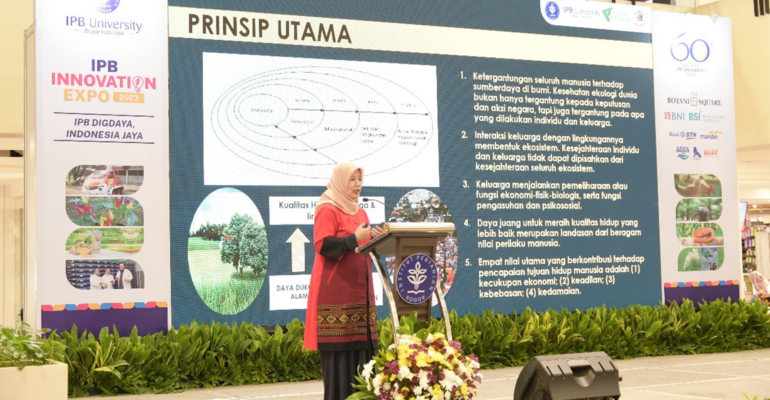This is the Main Strength of IPB University’s Social Innovation ‘Kampung Ramah Keluarga’

IPB University launched one of the social innovations, namely ‘Kampung Ramah Keluarga’. This innovation was initiated and developed by Prof Euis Sunarti from the Department of Family and Consumer Sciences, Faculty of Human Ecology, IPB University. The Family Friendly Village was officially introduced in the IPB Innovation Expo and Social Action Research Launching event, Friday (29/9) at Botani Square, Bogor.
Family is the smallest social unit that interacts and even transacts with the social environment and the natural environment, and the closest one is in the smallest unit of territory called the village. The problems and challenges faced by families today and in the future, lead to the realisation that it is increasingly important for families to make positive transactions with their immediate environment to build a family-friendly village.
“The main benefits of the social innovation of the Kampung Ramah Keluarga model are guaranteed effectiveness, acceleration, as well as breakthroughs in development and solving family problems and challenges,” said Prof Euis.
She further explained that the Kampung Ramah Keluarga model is holistic-comprehensive, covering all dimensions-aspects-sectors of development and comprehensive approaches-methods-techniques. Its implementation requires synergy between all sectors and stakeholders of family development, especially the empowerment of the family itself and all components in the village unit.
” Kampung Ramah Keluarga focuses on the upstream side, namely prevention as the core of family protection. However, it also handles the downstream side, namely handling the problems faced. This model also pays attention to aspects of guaranteeing continuity, survival, resilience, and sustainability of efforts to improve resilience, welfare, and family quality, including vulnerable groups,” she explained.
The Kampung Ramah Keluarga programme covers aspects of economy, education, health, and its derivatives, namely food security, livelihood patterns, work skills, nutrition, sanitation, and environmental health. Empowerment with a variety of approaches and methods such as counselling, training, mutual solidarity actions, food and nutrition assistance, health services and counselling to vulnerable individuals, families and communities and groups that need capacity building, are the actions of this social innovation. This is also the case with increasing social capital and institutional capacity within the village community.
Although the phrase ‘Kampung’ originally referred to an area unit in rural areas, the Family Friendly Village also applies to urban areas. The term ‘Kampung’ is used to maintain close social and kinship ties between neighbours, who are often extended families that provide social support for the nuclear family.
“The phrase ‘kampung’ is used even in urban areas. This is so that families in social transactions form neighbourhoods like extended families,” said Prof Euis.
Kampung Ramah Keluarga is part and even the core of ‘Family Friendly Regional Development’. This concept involves various parties (government and non-government) working together to create an area that has a high natural carrying capacity and environmental capacity, as well as infrastructure facilities that allow families to carry out their functions in a balanced manner. This effort also aims to enable families to earn a prosperous livelihood.
Prof Euis said, the development of family-friendly areas encourages families to transact (material, energy, information) with their environment (natural, social, and human-built environment) in a good and positive manner so that in turn it brings results in the form of positive feedback. In this way, it is possible to achieve quality family life and a quality and sustainable environment. Poor family transactions with the environment lead to a decrease in environmental capacity and natural carrying capacity, as well as social carrying capacity.
“The development of social innovation of Kampung Ramah Keluarga in the digital era and Indonesia 4.0 is an asset to prepare society towards ‘Society 5.0’. However, the strength of ‘human, family and social capital’ which is the spirit of Family Friendly Village should be strengthened by information about the variety of socio-economic changes and predictions of their consequences for changes in the portrait of family life,” she explained.
Therefore, according to Prof Euis, recommendations are needed to anticipate the expansion of vulnerability and threats to families due to global changes. For this purpose, optimal utilisation of digital systems, IoT and big data to predict and provide strategic policy recommendations for family development is a must. (*/Rz) (IAAS/RUM)



